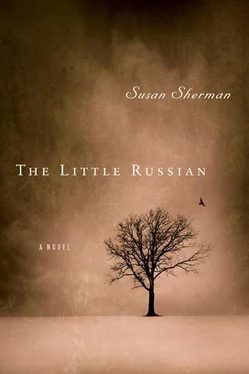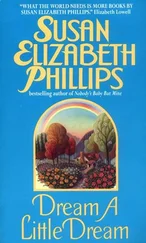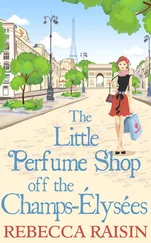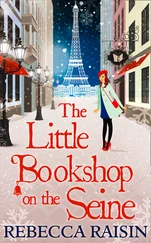“And what about Hershel Alshonsky?” she asked casually.
During the last of the summer she and Hershel had gone out for rides together, played chess in the tearoom, and picnicked on the spongy moss that grew alongside the streams. They had become friends, or so she had thought, but then the leaves began to fall and he started to come less frequently. Now it was winter and she hadn’t seen him in two months and eighteen days.
“Who?” asked Meshia Partnoy.
“Your lodger.”
“Oh him… I guess he will just have to find another place to stay, although it can’t be very easy this time of year. Still, he could look in Bogitslav. He might have some luck there. I know a place or two.” Then she stopped and looked at Berta, a slow smile of recognition spreading across her face. “Oh, I see how it is.”
“How what is?”
“Well, he’s not exactly handsome, but they say he’s a real macher . Real smart, if you know what I mean. And he knows how to make a kopeck or two.”
“I don’t know what you’re talking about. I was just making conversation.”
“He is educated. And they say he has a real nice house in Cherkast. You could do worse.”
“I don’t see what that has to do with me. I was just curious, that’s all.”
“Of course you were,” Meshia Partnoy said, with an exaggerated look of solemnity.
Berta buttoned up her blouse, tucked it in, and gathered up her things. “Good-bye, Froy Partnoy,” she said coolly.
“Good-bye, Berta, and good luck.”
Berta left the women’s bath without bothering to say good-bye to the bath keeper’s wife or even stopping to put on her hat. After a short walk home she arrived at the grocery door with a helmet of frozen hair.
The next day was the yarid , market day, and Berta was working the counter. The grocery was crowded with muzhiki, women mostly, who came in with a rush of cold air, the snow melting from their hair and sheepskin jackets, stamping their felt boots on the wooden floor that was soggy and bowed at the door from years of traffic. Berta should have been tending to the customers, but her mind wasn’t on the task. Instead her eyes kept straying out the window to the shoppers in the square and to the rows of sledges where the horses dozed under their dugas .
“Where are you going?” asked Mameh when she saw Berta taking her coat off the hook.
“I have to go out. I’ll be right back.” She pulled a scarf out of her pocket, fit it over her head, and tied it under her chin.
“But it’s the yarid . You can’t just leave.”
“I’ll only be a few minutes, Mameh. Lhaye is here. She’ll help and there’s always Tateh.”
“We have customers. I need you here.”
“I said I’ll be right back.”
Berta opened the door, stepped outside, and closed it even though she could still hear her mother talking to her. She stood on the step, putting on her gloves and surveying the square. Her eyes moved from the stalls, to the stack of folding chairs leaning up against the tearoom, to the horses marking the frigid air with their breath. She walked up a row, moving in and out of the crowds, looking at the men leaning up against the tavern wall, at the porters huddled around a fire in an old drum, at the muzhiki playing cards around a bench that had been cleared of snow. Then she moved back down another row, searching out the faces, the dark corners, and the storefronts.
“Looking for somebody?” It was the shul klopfer , the old man who called the men to prayers. He held a bloody handkerchief in his hand. His face was white, drained of all color, and he kept moistening his cracked lips with his tongue.
“No, no one.”
“Maybe I can help?”
“No… but thank you.”
She liked the little shul klopfer . He had always been kind to her. She wanted to say more, maybe ask about his health or his family, but before she could say anything, he doubled over, coughing up blood into his handkerchief.
By closing time she knew Hershel wasn’t coming. She thought he had probably found a place in Bogitslav and she would never see him again. Even though it was dark and the square was empty, she took one last look around as she brought in the rakes and hoes and rolled in the barrels. She turned the sign, closed the door, and locked it with the brass key that was smooth with wear. Then she pulled down the shades and, after blowing out the lamps, climbed the stairs, only half listening to her parents, who were arguing about money in the kitchen.
They often argued about money, so it was a surprise to find Lhaye on the steps listening to them. When Lhaye heard Berta coming up the stairs, she turned and held a finger to her lips and motioned her to sit down beside her.
“He is not coming to ruin my daughters,” Tateh was saying. “He is coming to buy wheat. And while he is at it he’s going to stay in our house.”
“For what? For ten rubles? You are willing to ruin the reputation of your daughters for ten rubles? Do you know how people will talk?” Mameh had a love for news , as she liked to call it. She knew what constituted good fodder for gossips, especially since she was known to indulge in it herself.
“Nobody is going to ruin anybody’s reputation. He will be a lodger, that’s all. People will understand. He’ll stay in the linen closet.”
“And how will he stay there?”
“I’ll take out the shelves.”
“And where will we put the linens?”
“What linens? A few towels. Put them somewhere else. Rivke, ten extra rubles !”
“Who are they talking about?” whispered Berta.
“Reb Alshonsky.”
Berta stopped and shifted her gaze back to her parents. From where she was sitting she had a good view of their feet. Her mother’s solid shoes planted implacably on the smooth planks, her father’s worn boots shifting the weight of his body first to one foot and then to the other as he sought relief from the pain in his lower back. She had heard them argue before, only this time she was keenly aware that they were arguing about her future. She had decided some time ago that her future lay with Reb Alshonsky. And now fate, if she believed in fate, which of course she didn’t, was bringing him to her. But she was also aware that it hinged on her mother doing something that she had never done before, an act of capitulation that was completely out of character for her: Her mother would have to concede to her father and let him win an argument. This seemed inconceivable to Berta as she sat on the stair, listening to their every word and whispering an urgent prayer to a God she feared did not exist.
HERSHEL ARRIVED during the last of the great storms. Berta was just closing up when he appeared out of the swirling snow wrapped up in a greatcoat and wearing a papakha on his head. He told her that he had been away on the Black Sea and gave her a little box covered in red and orange cockle shells. They stood by the stove talking about his travels, about a trip to Moscow and another one to Petersburg. He didn’t explain why he had been away so long and she didn’t ask.
“So, is my room finished?”
“It is. But my mother doesn’t want you staying here.”
“I thought she liked me,” he said, removing his gloves and holding his hands up to the dying fire. He hadn’t yet taken off his coat. Melted snow circumscribed a neat circle of damp on the floor beneath him.
“Not since she found out you’ll be sleeping in our linen closet. She thinks you’re going to ruin our reputation and come into our room at night and have your way with us. She calls you a mazzik , a demon, so if you want to stay here, you’ll have to win her over. Although, that won’t be easy.”
Читать дальше












